Dashnor Kaloçi
The first part
Memorie.al publishes an archival document issued by the Central State Archive in Tirana (Fund of the former Central Committee of the ALP), which contains the minutes of the conversation between a senior delegation of the ALP and the government of the People’s Republic of Albania headed by Prime Minister Mehmet Shehu (which also included: Ramiz Alia, Mihallaq Ziçishti, Rahman Perllaku, Tonin Jakova, Comrade Agim Mero, Comrade Foto Çami, Comrade Piro Bita, and Vasil Nathanaili), during the reception given in honor by the main leader of the People’s Republic of China, Mao Zedong, who was accompanied by the Prime Minister, Chu En Lai, (which also included: Kang Sheng, Liu Ningyi, Liu Xiao and Luo Wei Bo). The full conversation of the senior delegation of the Albanian leadership with the main leaders of the People’s Republic of China, which took place on the eve of the celebrations for the 18th anniversary of the founding of the People’s Republic of China, where various issues and problems were discussed, such as: Great Cultural Proletarian in China, relations between the two countries, the support of the Communist Party of China by communists and Marxists-Leninists from around the world, the detection and unmasking of traitors under the leadership of the Chinese Communist Party, such as: Liu Shaochi, Wang Ming, Chen Duxiu, Peng Zhen, Bo Yibo, An Ziwen, etc., as well as in the Communist Party of Albania, since Koci Xoxe, Liri Belishova, etc.
Although Enver Hoxha and the entire senior leadership of the ALP, for almost two decades (1959-1979), greatly promoted the unbreakable friendship with the People’s Republic of China and its Communist Party led by great “, President Mao, friendship” forged in the heart of revolutions “, even presenting Albania in the eyes of its people and in the international arena, as the friendliest place that People’s China had in the whole world, seems not to have been all as deliriously presented by the communist leadership of Tirana. Not only that, but even Mao Zedong did not even remember if he had ever met the Albanian Prime Minister Mehmet Shehu, during his visits to the People’s Republic of China, and did not even know the Albanian ambassador in Beijing and also how long he served in that task! All these, among other things, are made known by a record of the conversation held between the senior delegation of the ALP and the government of the People’s Republic of Albania, headed by the Prime Minister, Mehmet Shehu, during the reception given to them by of the senior leadership of the Communist Party of China headed by Chairman Mao Zedong and the Prime Minister of the People’s Republic of China, Chu En Lai, held on September 30, 1967, in Beijing. For more about this meeting, we are informed of the minutes of the conversation between them, which Memorie.al publishes in full and for the first time, together with the relevant facsimiles.
Minutes of the meeting between the delegation of the ALP and the Albanian government headed by Mehmet Shehu, with the senior leadership of the People’s Republic of China, chaired by Mao Zedong and Chu En Lai, in Beijing, on September 30, 1966
R A P O R T I
OF THE MEETING OF THE CENTRAL DELEGATION OF THE ALP AND THE GOVERNMENT OF THE PEOPLE’S REPUBLIC OF ALBANIA, headed by comrade MEHMET SHEHU, with comrade MAO CE DUN, on 30 SEPTEMBER 1967
On September 30, 1967, the delegation of the ALP and the government of the Republic of Albania, headed by the member of the Political Bureau of the Central Committee of the ALP and the Chairman of the Council of Ministers, Comrade Mehmet Shehu, were received by Comrade Mao Ce Dun.
The meeting was attended by the following Albanian friends: Comrade Ramiz Alia, Comrade Mihalaq Zicishti, Comrade Rahman Perllaku, Comrade Tonin Jakova, Comrade Agim Mero, Comrade Foto Çami, Comrade Piro Bita, and Comrade Vasil Nathanaili.
The Chinese side was represented (also) by: Comrade Chu En Lai, Comrade Kang Sheng, Comrade Liu Ningyi, Comrade Liu Xiao, and Comrade Luo Wei Bo.
The conversation started around 4:15 pm and continued until 5:15 pm the translation from Chinese was done by Fan Chengzuo. The report was recorded by stenographers by Sadik Myftiu and transcribed with the participation of Sotir Naçi. The final editing was done by Piro Bita.
MAO CE DUN: When was the last time you visited China?
MEHMET SHEHU: Last year, in May.
MAO CE DUN: Did we meet then in Shanghai?
MEHMET SHEHU: Yes, in Shanghai.
Comrade Mao Zedong, allow me to bring the most cordial and revolutionary greetings of the Albanian Labor Party, the Central Committee and personally of Comrade Enver Hoxha, as well as all the Albanian people. We are extremely happy to have been given the opportunity to visit your country on the eve of the celebrations for the 18th anniversary of the founding of the People’s Republic of China, and at a time when the Great Proletarian Cultural Revolution is at the highest stage of its development. . On behalf of our people, the party and Comrade Enver Hoxha, we greet you on your great anniversary, in the final victory of the Great Proletarian Cultural Revolution, and wish you, Comrade Mao Zedong, a long life, a long life, long life.
MAO CE DUN: Thank you very much. I wholeheartedly welcome you, and all the comrades of the party and government delegation headed by you, once again to our country.
Last year your delegation was not as big as this one.
MEHMET SHEHU: Yes, it was smaller than this.
MAO CE DUN: Please introduce me to your friends.
MEHMET SHEHU: (After introducing one by one the comrades of the delegation who were present at the meeting, he said): the other comrades who participate in our delegation are representatives of the working class, the cooperative peasantry, etc.
Comrade Enver Hoxha and the Central Committee and the party government have given our delegation a great mission and a very important task: to further strengthen our friendship with the great People’s China, led by Comrade Mao Zedong; they have also given us the task of expressing once again our solidarity and our full support for the Great Proletarian Cultural Revolution initiated and led by you, Comrade Mao Zedong.
MAO CE DUN: Thank you very much. The imperialists do not support us, nor do the revisionists; nor have the reactionaries of various countries, including Jiang Jieshi, supported us. Only you support us, and some sister parties and communist groups around the world; there are also some democrats in Asian and African countries who support us. So, for example, the Communist Party of the United States of America is against us, but there is another organization, the Progressive Labor Party, that supports us. The same thing happens in France and Italy, for example, where communist parties are against us and against you, but (other) communist groups and the new party that was just founded in Italy support us.
Our task is, first of all, to do our homework well, as you have done by taking so many measures.
Do you remember the conversation we had together last year in Shanghai? Were you there too, Comrade Kang Sheng?
KANG SHENG: No, I was not there. I was in a meeting this year (February 1967) when you met Comrade Hysni Kapo and Comrade Beqir Balluku.
ÇU EN LAI: I was there and so was Comrade Lin Biao.
MAO CE DUN: Between our meeting last year and the time when comrade Hysni Kapo and comrade Beqir Balluku came here, I thought the situation in our country as very serious. I told them that, first, there is the risk of the revolution failing, and also that there is another possibility, that we will emerge victorious.
MEHMET SHEHU: You talked about this with our delegation in Shanghai, Comrade Mao Zedong. I remember that was one of the main issues you raised at that meeting.
MAO CE DUN: I told comrade Hysni Kapo that after three months we can probably see a little more clearly what the form of movement will be in the future. But what happened after that? February, March, April, May, June, July, August and September; in other words, 9 months. Now I can tell you two friends and fellow comrades that we can see not only the general form, but the actual form and the issue of victory. Now the chance for us to emerge victorious is the only chance. However, we must be prepared for another opportunity, the risk of failure, because no harm will come to us if we are also prepared for such an opportunity.
For more than a year, China went through a major upheaval. But there is not much confusion. There is not much confusion in Beijing either; is a fairly civilized city. Recently, I have visited many provinces. I can say they are a bit furious. But the bigger and more complete the concern, the better it will be. It happens that in a (industrial) factory the workers are divided into two large groups. Why Because one group is supported by some people while the other group is supported by other people. In other words, the left group is supported by Marxists-Leninists, while the other is supported by revisionists. Sometimes collisions can seem catastrophic. A great collision happened these last 3-4 months, which means from the end of June until now.
ÇU EN LAI: Ever since the June 6 circular came out.
MAO CE DUN: After the victory in 1949, we had in our society not only people trained by the Kuomintang (Kuomintang) and bourgeois people, but we also had some bad people who joined our party. You also had a member of your Politburo, Liri Belishova (expelled from the Central Committee in September 1960).
MEHMET SHEHU: We did not have only one, but several. Liri Belishova was one of the last enemies who fought us from within the party and the Central Committee. Since its inception, our party has consistently waged a long and relentless struggle against these elements; she has cleared her ranks through that war. During October last year we expelled from the party a member of the Central Committee for hostile activities against the party line.
MAO CE DUN: This is the dialectical law of things and phenomena.
A party that is the exception and has no right-wing elements among it cannot be conceived.
Why was the First International of Marx and Engels dissolved? Did it not happen because Marxists were the minority and anti-Marxists were the majority? Wasn’t that so? At that time, Proudhon, Blanqui, Lassalle, etc., emerged from the ranks of the First International. As a result, in the end, the First International disbanded.
But can it be said that there were no good and determined people in the world after the dissolution of the First International? As is known, later, socialist parties were formed in different countries: the Social Democratic Party in Germany, the Socialist Party in France, the Labor Party in England, the Socialist Party in Italy and the Social Democrat of Russian Workers Party in Russia. The same thing happened in other countries. All of these parties came together in the Second International. They all considered themselves Marxist parties.
But in the end it became clear that those who were truly Marxists were only Lenin and his group. At that time in Europe, in most parties, only certain elements or groups supported Lenin, while the rest of the Second International became a tool of imperialism. Was that a very bad thing, perhaps? I think it was not because, later, the Third International was formed. Small groups that existed in Germany, France, Italy, etc. They turned into big parties. I’m not talking about Russia here, where we know very well which party was formed.
But what do these Third International parties look like today? Now we see that the situation looks bad only in appearance. Are there people now who say that only your party and ours still exist? My opinion is that in your country things can be improved, while in our country it will be difficult for things to go well. This is evidenced by the history of our party. The first general secretary of our party, Chen Duxiu, made mistakes of right-wing deviation. During the first revolutionary civil war, Kuomintang turned from an ally to an enemy and developed white terror. Kuomintang suddenly attacked us and broke our party into floating debris. After the terror only about 10 thousand communists were left.
We learned lessons from the events there. We had two teachers in this: Jiang Jieshi and Chen Duxiu. Then we realized that it is not enough for the movement to develop only by mobilizing the masses. At that time we had representatives of our party in government, we had about millions of workers and tens of millions of peasants under the leadership of our party, but what happened as a result? Within a morning we were completely destroyed. So we have often addressed this lesson to representatives of sister parties. But they did not pay proper attention to this. We have told them that even if you have many party members, many organized peasants and many trade unions, and even if you have representatives of your party in government, you still should not think you are safe.
RAMIZ ALIA: I believe you are talking about Indonesians?
MAO CE DUN: Yes, I’m talking about them.
KANG SHENG: As far as I remember, Chairman Mao has discussed this issue four times with Aidit.
MAO CE DUN: I have told them many times to never believe the good words that the bourgeoisie says to them, because we already know where this leads. I have spoken to them about armed struggle. I pointed out that our first war lasted for 10 years in a row and during these 10 years we made mistakes three times. The first mistake was a “left” mistake; was made by the Central Committee of the party when headed by Xiang Zhongfa.
MEHMET SHEHU: We also had some people of this type; in fact, more than one.
MAO CE DUN: We later discovered Li Lisan’s right mistakes. And even later, the Wang Ming line came out; he will now be in Moscow. We have not officially expelled him from the party, but in fact he is an enemy. Later, during the Long March, we had the meeting in Zunyi. We have corrected the errors of this course in the general lines. At that time, for 10 years in a row, the general secretary was Zhang Wentian. He led the party.
I became party chairman in 1945, the year of the defeat of Germany and Japan. I do not mean by this that I have done a good job as party chairman because one can be split in two. But if anyone were to accuse me of being an anti-Marxist, a Trotskyist, a nationalist, or a capitulator before American imperialism, that is something I cannot accept. Neither the American imperialists, nor the Khrushchevite revisionists, nor the Jiang-jieshists believe this. I have not met the leaders of American imperialism, but I personally know N. Khrushchev, Kosygin, Nehru, and Jiang Jieshi, an old friend of mine; but the Earth still rotates.
We have managed some tasks well in China and some others we have not achieved. If everything in our country had gone well, then why would we have to make the Great Proletarian Cultural Revolution? This means that in our country there are some people who are still in the dark. It is towards this segment that we must direct our revolution. Now you know against whom he directs this revolution (his knife). You also know well the way it works.
Comrade Ambassador, how long have you been in Beijing?
VASIL NATHANAILI: I have been here for a year and a half. Memorie.al
The next issue follows




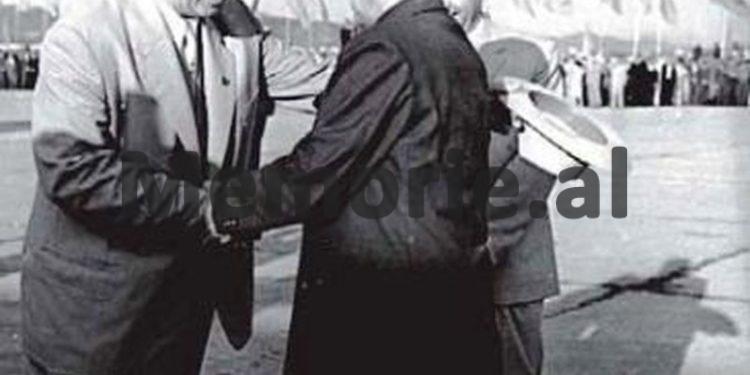
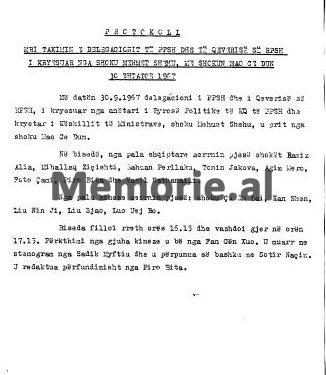
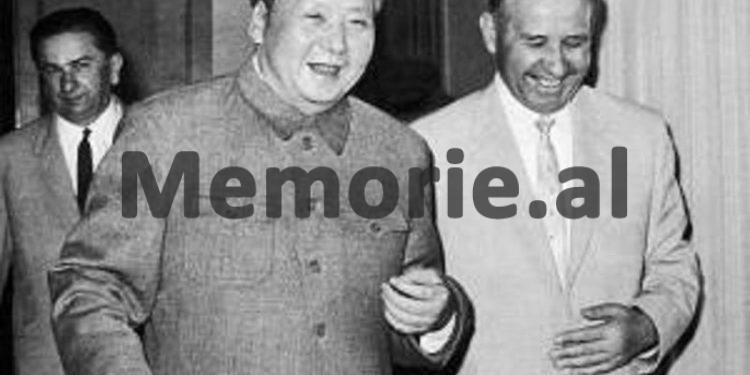
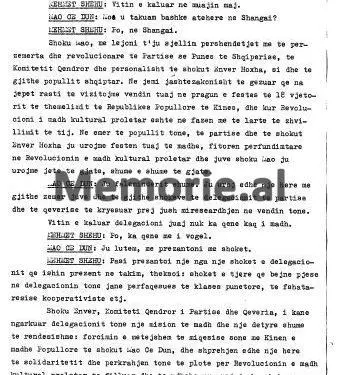
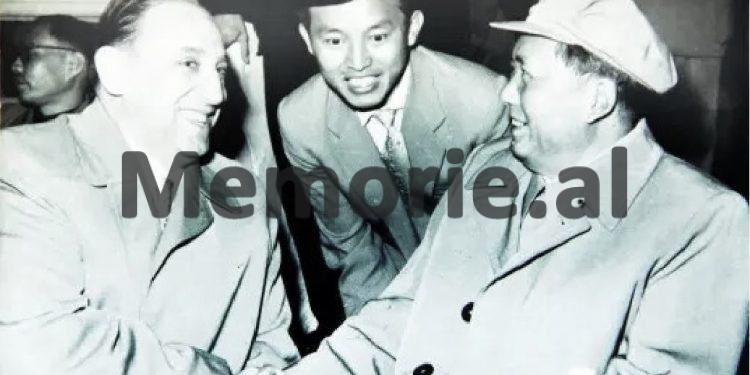
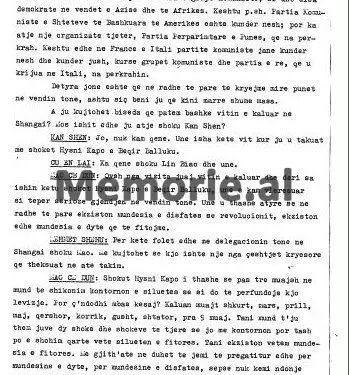
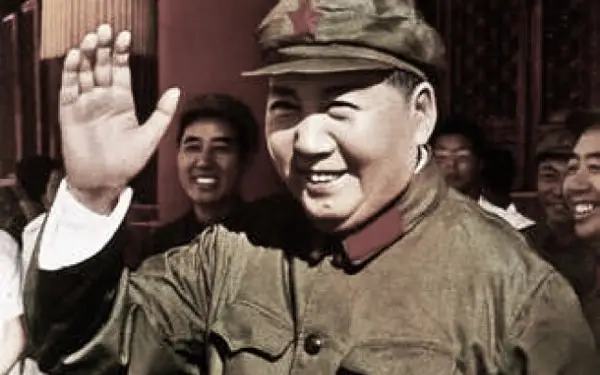
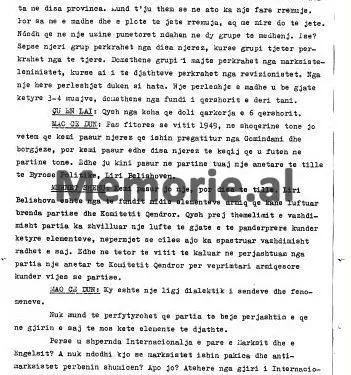
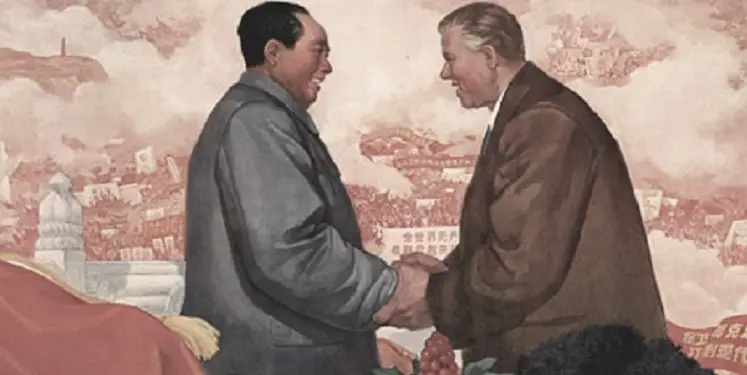
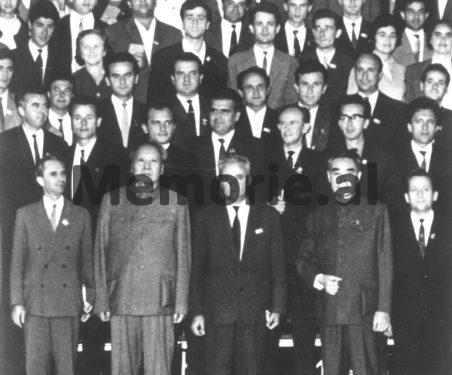
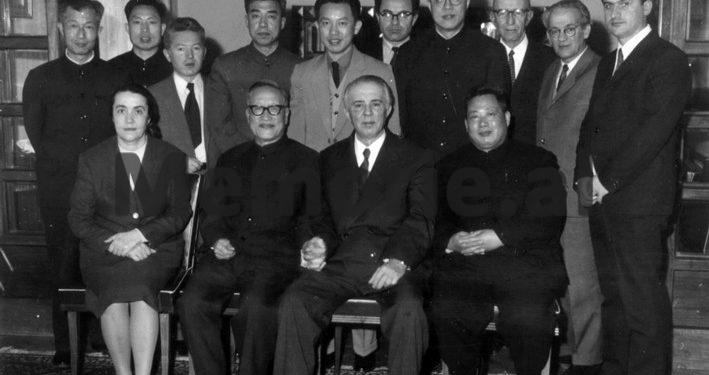
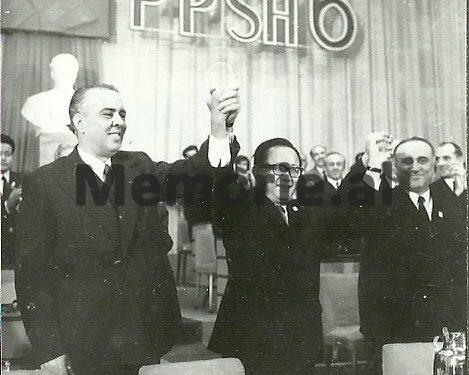
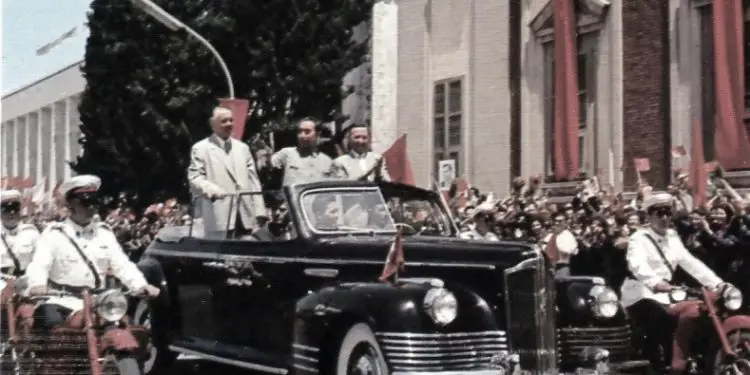
![“When the party secretary told me: ‘Why are you going to the city? Your comrades are harvesting wheat in the [voluntary] action, where the Party and Comrade Enver call them, while you wander about; they are fighting in Vietnam,’ I…”/ Reflections of the writer from Vlora.](https://memorie.al/wp-content/uploads/2025/06/admin-ajax-4-350x250.jpg)


![“The ensemble, led by saxophonist M. Murthi, violinist M. Tare, [with] S. Reka on accordion and piano, [and] saxophonist S. Selmani, were…”/ The unknown history of the “Dajti” orchestra during the communist regime.](https://memorie.al/wp-content/uploads/2026/02/admin-ajax-3-350x250.jpg)
![“In an attempt to rescue one another, 10 workers were poisoned, but besides the brigadier, [another] 6 also died…”/ The secret document of June 11, 1979, is revealed, regarding the deaths of 6 employees at the Metallurgy Plant.](https://memorie.al/wp-content/uploads/2026/02/maxresdefault-350x250.jpg)

